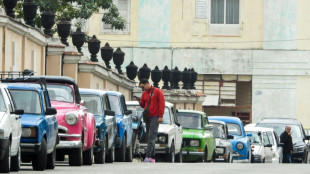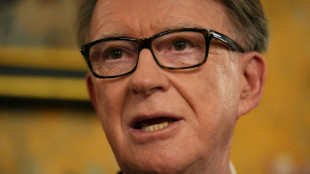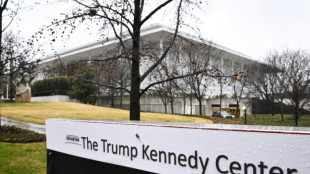-
 Djokovic hints at retirement as time seeps away on history bid
Djokovic hints at retirement as time seeps away on history bid
-
US talking deal with 'highest people' in Cuba: Trump

-
 UK ex-ambassador quits Labour over new reports of Epstein links
UK ex-ambassador quits Labour over new reports of Epstein links
-
Trump says closing Kennedy Center arts complex for two years

-
 Reigning world champs Tinch, Hocker among Millrose winners
Reigning world champs Tinch, Hocker among Millrose winners
-
Venezuelan activist ends '1,675 days' of suffering in prison

-
 Real Madrid scrape win over Rayo, Athletic claim derby draw
Real Madrid scrape win over Rayo, Athletic claim derby draw
-
PSG beat Strasbourg after Hakimi red to retake top spot in Ligue 1

-
 NFL Cardinals hire Rams' assistant LaFleur as head coach
NFL Cardinals hire Rams' assistant LaFleur as head coach
-
Arsenal scoop $2m prize for winning FIFA Women's Champions Cup

-
 Atletico agree deal to sign Lookman from Atalanta
Atletico agree deal to sign Lookman from Atalanta
-
Real Madrid's Bellingham set for month out with hamstring injury

-
 Man City won't surrender in title race: Guardiola
Man City won't surrender in title race: Guardiola
-
Korda captures weather-shortened LPGA season opener

-
 Czechs rally to back president locking horns with government
Czechs rally to back president locking horns with government
-
Prominent Venezuelan activist released after over four years in jail

-
 Emery riled by 'unfair' VAR call as Villa's title hopes fade
Emery riled by 'unfair' VAR call as Villa's title hopes fade
-
Guirassy double helps Dortmund move six points behind Bayern

-
 Nigeria's president pays tribute to Fela Kuti after Grammys Award
Nigeria's president pays tribute to Fela Kuti after Grammys Award
-
Inter eight clear after win at Cremonese marred by fans' flare flinging

-
 England underline World Cup
credentials with series win over Sri Lanka
England underline World Cup
credentials with series win over Sri Lanka
-
Guirassy brace helps Dortmund move six behind Bayern

-
 Man City held by Solanke stunner, Sesko delivers 'best feeling' for Man Utd
Man City held by Solanke stunner, Sesko delivers 'best feeling' for Man Utd
-
'Send Help' debuts atop N.America box office

-
 Ukraine war talks delayed to Wednesday, says Zelensky
Ukraine war talks delayed to Wednesday, says Zelensky
-
Iguanas fall from trees in Florida as icy weather bites southern US

-
 Carrick revels in 'best feeling' after Man Utd leave it late
Carrick revels in 'best feeling' after Man Utd leave it late
-
Olympic chiefs admit 'still work to do' on main ice hockey venue

-
 Pope says Winter Olympics 'rekindle hope' for world peace
Pope says Winter Olympics 'rekindle hope' for world peace
-
Last-gasp Demirovic strike sends Stuttgart fourth

-
 Sesko strikes to rescue Man Utd, Villa beaten by Brentford
Sesko strikes to rescue Man Utd, Villa beaten by Brentford
-
'At least 200' feared dead in DR Congo landslide: government

-
 Coventry says 'sad' about ICE, Wasserman 'distractions' before Olympics
Coventry says 'sad' about ICE, Wasserman 'distractions' before Olympics
-
In-form Lyon make it 10 wins in a row

-
 Man Utd strike late as Carrick extends perfect start in Fulham thriller
Man Utd strike late as Carrick extends perfect start in Fulham thriller
-
Van der Poel romps to record eighth cyclo-cross world title

-
 Mbappe penalty earns Real Madrid late win over nine-man Rayo
Mbappe penalty earns Real Madrid late win over nine-man Rayo
-
Resurgent Pakistan seal T20 sweep of Australia

-
 Fiji top sevens standings after comeback win in Singapore
Fiji top sevens standings after comeback win in Singapore
-
Alcaraz sweeps past Djokovic to win 'dream' Australian Open

-
 Death toll from Swiss New Year bar fire rises to 41
Death toll from Swiss New Year bar fire rises to 41
-
Alcaraz says Nadal inspired him to 'special' Australian Open title

-
 Pakistan seeks out perpetrators after deadly separatist attacks
Pakistan seeks out perpetrators after deadly separatist attacks
-
Ukraine war talks delayed to Wednesday, Zelensky says

-
 Djokovic says 'been a great ride' after Melbourne final loss
Djokovic says 'been a great ride' after Melbourne final loss
-
Von Allmen storms to downhill win in final Olympic tune-up

-
 Carlos Alcaraz: tennis history-maker with shades of Federer
Carlos Alcaraz: tennis history-maker with shades of Federer
-
Alcaraz sweeps past Djokovic to win maiden Australian Open title

-
 French IT giant Capgemini to sell US subsidiary after row over ICE links
French IT giant Capgemini to sell US subsidiary after row over ICE links
-
Iran's Khamenei likens protests to 'coup', warns of regional war

Bolivia at breaking point
In recent months, Bolivia has lurched from crisis to crisis. Long queues at gas stations, sporadic road blockades, and clashes between rival political camps have fed fears of a broader internal conflict. A year after a failed military putsch shook La Paz, the country now faces a decisive political transition against the backdrop of a rapidly deteriorating economy. As of August 18, 2025, preliminary results point to an October 19 runoff that ends two decades of dominance by the ruling movement—an inflection point that could steer the country toward stabilization or push it closer to a dangerous spiral.
A political rupture with violent undertones
Bolivia’s governing bloc fractured into warring factions after the split between President Luis Arce and his onetime mentor, former president Evo Morales. That rift spilled into the streets this year: blockades, counter-mobilizations, and deadly confrontations were recorded in mining towns and highland corridors, with church leaders warning of a “spiral of violence.” Those tensions sit atop the still-raw memory of June 26, 2024, when armored vehicles briefly surrounded the presidential palace before the putsch collapsed and commanders were arrested.
The economic picture is grim. In January, a major rating agency cut Bolivia to CCC-, citing vanishing foreign-exchange buffers and looming external payments; by its estimate, the country faced around $110 million in Eurobond coupons this year with only about $47 million in liquid reserves at one point. Fuel imports—long subsidized—have repeatedly faltered, triggering national transport strikes, border disruptions, and days-long lines for gasoline and diesel. Inflation, once among South America’s lowest, surged to multi-decade highs through mid-2025.
A chronic dollar shortage has fractured the currency regime: while the official rate stayed near 6.96 bolivianos per dollar, a thriving parallel market developed. By late July the street rate hovered around 14 BOB per USD—stronger than its worst levels earlier in the year, but still far from the peg—underscoring lost confidence. As households and small firms struggled to access currency, some turned to crypto and informal finance as workarounds.
Gold and gas: lifelines with limits
To scrape together hard currency, authorities leaned on the country’s booming (and often opaque) gold trade, monetizing bullion to raise billions in fresh dollars—an emergency bridge, not a structural fix. Meanwhile, the gas engine that powered Bolivia for two decades has sputtered. Exports to Argentina ended in 2024 as output slumped, and in a symbolic reversal this year, Argentina began shipping Vaca Muerta gas through Bolivia toward Brazil using Bolivian pipelines—signaling how far the regional energy balance has shifted.
Why fears of wider conflict are not far-fetched
No single spark guarantees a slide into civil war, but several risk factors now overlap: factionalized parties with loyal street bases, pockets of armed actors and hardliners, a legitimacy fight around barred candidacies and court rulings, and an economy that can no longer cushion shocks with cheap fuel or a steady dollar supply. Independent monitors have recorded lethal violence tied to the intra-left feud, while civic leaders in blockaded towns report confrontations between residents, protesters, and security forces. Each new blockade erodes livelihoods, deepens scarcity, and shortens tempers—a classic recipe for escalation.
The runway to October—and what comes after
The first-round result has upended Bolivia’s political map: two opposition figures advanced and the ruling movement’s candidate finished far behind, all amid the worst macro stress in a generation. Whoever wins in October will inherit unpopular choices: rationalizing fuel subsidies, rebuilding reserves, restoring a functional FX market, and reviving the gas sector while speeding up transparent lithium and gold governance. Failure risks further shortages, more street battles over scarcity, and a dangerous normalization of political violence. Success demands a credible stabilization plan, broad buy-in from unions and regional elites, and early signals—like targeted cash transfers and a clear, time-bound subsidy path—to keep social peace while reforms bite.

Zelenskyy: ‘What worked in Israel work also in Ukraine’

Electric car crisis: Future of a Audi plant?

Vladimir Putin, War criminal and Dictator of Russia

EU vs. Hungary: Lawsuit over ‘national sovereignty’ law

Ukraine: Zelenskyy appeals for international aid

Lebanon: Is a new wave of refugees coming to the EU?

Terrorist state Iran attacks Israel with missiles

Belarus: ICC investigates dictator Lukashenko

NATO: Ukraine ‘at the top of the list!’

NATO is training to fight cyber attacks

Digital Ocean Twin: Protecting the Oceans



